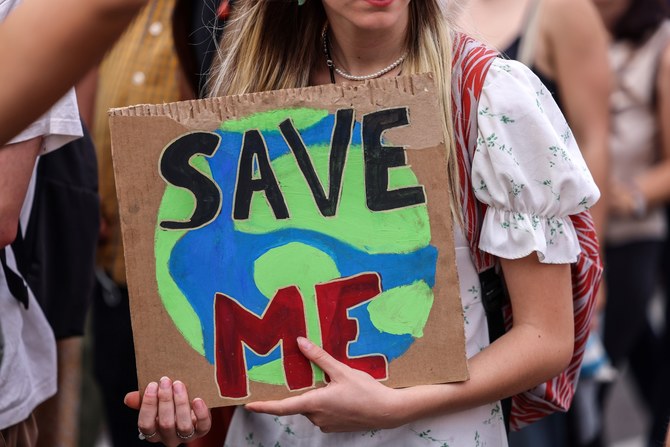Eugene Willemsen
Youth is wasted on the young, so the old saying goes. When we are young, we have not been around long enough to experience the ravages of time on things we hold dear (for example, our health), nor have we gained the wisdom that comes with time to look after those things that are priceless.
But time is the resource that is all upside down for the youth of today. Growing up on a rapidly warming planet, they have seen the damage to our environment without having to look far. And while they have not had the decades of developing solutions and implementing action that previous generations had, they have been promptly ushered into the starting stalls of the climate regulating race, with the hopes of the world pinned on them. It would be daunting for anyone to “save the world,” so no wonder that eco-anxiety is a genuine concern. “Great Expectations: Arab Youth’s Sustainability Priorities,” an Economist Impact report supported by the Arab Youth Center, notes that 70 percent of Arab youths have felt anxious about the future of the environment and the impact of climate change. But they are also taking action. Almost all (98 percent) young Arabs surveyed say that they have made environmentally conscious lifestyle choices over the past year, including reducing food waste, limiting water and energy use, and recycling household waste.
Their large share of this challenge is not fair, but it is true that the young individuals all around us, inspiring us, thinking differently about things, mandating urgency from the public and private sectors and driving positive impact in their personal capacity, are some of the strongest changemakers we have in the climate change fight. So, how do we come together to harness the power of youth and its ability to reinvent, renew and reshape to move climate action forward?
To start with, the simplest and most straightforward first step, education, is critical. Education’s key role in addressing climate change was emphasized when UNESCO launched its global youth survey report, which revealed that 70 percent of young people question the quality of the climate change education they receive. An even larger majority (77 percent) strongly agree climate change should be taught by people from various backgrounds, to address the complexity of the issue. Young people are bored of passive learning. They want to absorb skills in engaging, hands-on ways, including experiential, project-based activities. Increasing youth participation in society is among Vision 2030’s key goals and Saudi Arabia is pouring investment into initiatives that can provide youths with more opportunities to drive positive change. Environmental education is already integrated within school curricula, university courses and related scholarships in Saudi Arabia. However, experts have pointed out that institutions should lead the transition to green jobs to support the move to a low-carbon economy and leverage existing research from universities to facilitate knowledge transfer. The private sector has a critical role to play in this – whether that is through investment in targeted programs, advancing sustainability infrastructure within educational institutions or raising ambitions for the jobs of the future, we have the power to shape mindsets and shift behavior patterns from a young age.
We already know that innovative climate technologies are necessary to slow down and adapt to the impact of climate change and extreme weather. Young people’s willingness to question the status quo and think outside the box can lead to breakthrough ideas and solutions. It is important that we motivate, enable, incentivize and support them to come up with technological solutions that can be developed and scaled up. To be successful, policies must enable bottom-up experimentation and learning from the youth and for the youth. Whether that is through youth-run platforms that share climate-related knowledge, partnerships that unleash innovation, funding that supports young people’s entrepreneurial ambitions or platforms that spark dialogue, there are several priority accelerators to help build a green, inclusive future. Young people are often at the forefront of climate action, yet they cannot shoulder the responsibility for tackling the crisis alone.
The power of networks, contacts and collaborative efforts cannot be underestimated. If we want to extract the best thinking and innovation, we need to enable the youth to tap into a wider network of influence, including government ministries, private companies, community centers, business groups, universities, advocacy organizations, environmental, social and governance consultancies, thought leaders and sustainability champions. Through the Arab Youth Hackathon, young people have the opportunity to create smarter solutions for solving climate challenges and have their voices put to the forefront with stakeholders across the board, including universities, entrepreneurial networks, investors and private sector players, who, with their resources and influence, can then drive this innovation at scale. Empowering the participation and action of youth – in addressing climate change, managing disaster risks and promoting movements and campaigns – is vital. COP28 is determined to ensure that youth voices and ambitions are a focal point of the climate process and, within the COP28 team, nearly 70 percent of negotiators are under the age of 35.
A dedicated COP28 youth climate champion has also been appointed to lead the first International Youth Climate Delegate Program cohort of 100 youth delegates, representing the world’s least-developed countries, small island developing states, Indigenous peoples and minority groups, making the sustainability conversation more inclusive. Access to networks and diverse angles and experiences alone are not enough. We need to build a community of resources and support that is positioned for longevity, allyship and proactive support. When youths posit, we must prioritize the time to be open to their ideas, share our own insights and generate new connections so the process of discovery and innovation continues. Young people must have a say in the climate policies of the future and these policies must explicitly reference youth, be rights-based, address the specific risks they face in multiple sectors like education, health, water, food security, nutrition and energy, and, above all, be inclusive.
We need to create an environment where the uniqueness and diversity of youth’s contributions, priorities and perspectives can thrive. For example, this can be through intergenerational dialogues to increase mutual understanding or by empowering them to be key stakeholders accountable for climate targets. Young people are comfortable in a world of dialogue and collaboration and, as the generation that will likely face the harshest outcomes of climate change, they are also motivated to contribute to solutions. They are already influencing behavior in their communities, urging policymakers to make formal changes and thinking innovatively about how to tackle environmental challenges. In the wake of Saturday’s International Youth Day, we must face up to the reality that it is up to all of us to give this generation everything we can possibly give, to bring change that matters. It is a responsibility we must embrace. It is an opportunity we must make the most of. It is a chance for everyone to do what is right for the planet.







